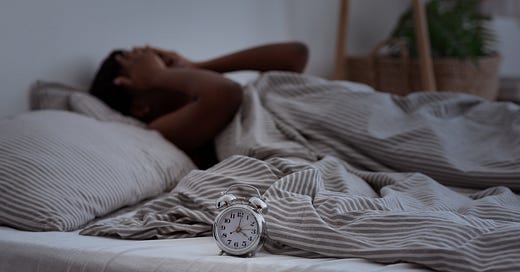One morning this week I woke before the alarm feeling alert, refreshed, and ready to start my day. I tiptoed out of the bedroom to my computer to check the news and received a rude shock. It was only 4 a.m.
Waking up hours before dawn’s early light is not a frequent problem for me – yet – but it’s uncomfortably common for many of us as we age. We sleep less, and we sleep less well.
According to a National Sleep Foundation survey, between one-fourth and one-third of adults over 55 say the quality of their sleep has diminished over time. Other studies suggest that from 40% to 70% of older adults have chronic sleep issues, though up to half the cases are undiagnosed.
First let’s dispose of the myth that adults don’t need as much sleep as other adults. FALSE! The medical community is pretty unanimous in the view that we need just as much sleep as we’ve always needed as adults – between 7 and 8 hours.
But many of us aren’t getting it, for a variety of reasons – some tied to specific medical conditions (sleep apnea, pain, cardiac issues) or medications for those conditions. Alcohol, recreational drugs, tobacco, and caffeine also interfere with sleep.
The Clock Misses A Beat
Those health and lifestyle variations aside, sooner or later most of us will face a factor outside of our control. The mechanism in our brains that controls our 24-hour biological clock wears down over time. This throws off our circadian rhythms, which regulate our sleep. A frequent result is what the medical community calls a “phase advance.” Roughly translated, your body experiences Daylight Savings Time on steroids. Instead of falling asleep at 11 p.m. and waking up rested at 7 a.m., you start falling asleep at 9 p.m. (or 7 p.m.) and then surprise! You’re wide awake at 3 – 5 a.m. and can’t get back to sleep.
Some people try to bluff their way through their drowsiness, stifling yawns and staying up late just to be sociable, only to be surprised when they still wake up before the birds.
And This Matters Because…
Scientists have identified some of what happens when we sleep. We know our memories are processed and stored. We know our weary and worn cells use the time to restore themselves. We know that sleep promotes our immune system.
We also have a good idea of what happens when we don’t get enough good-quality sleep over time:
· We get irritable – on a spectrum from crabby to stabby.
· We have trouble with memory, especially short-term.
· Our brains go out to lunch. We have difficulty processing what we’ve learned.
· We are likely to gain weight.
· Our risk for Type 2 diabetes nearly triples.
· Our immunity to infections and inflammation weakens.
· We are more likely to be depressed.
· We have higher risks for cardiovascular disease and high blood pressure.
· Our skin loses elasticity and becomes loose and wrinkled.
· Our libido plummets.
· Our risk of Alzheimer’s disease increases.
· We are at higher risk of falling.
None of this bodes well for our long-term health or quality of life, so poor sleep is not something we should take (pardon the expression) lying down. Fortunately, there are things we can do to improve the quality and duration of sleep.
No, Don’t Sleep on It. Try this:
1. Have a regular sleep schedule. Go to bed and wake up at the same time each day (even weekends).
2. If you are waking up ridiculously early, go to bed early. Don’t fight your circadian rhythms; you’ll lose. Find ways to adjust to the new reality and go with the flow.
3. Don’t take long naps during the day; these could disrupt your nighttime sleeping. But a short nap (up to 30 minutes) seems to be okay.
4. Limit bedroom activities to sleeping and sex. Move the television to another room and move out other electronics. You want to associate the bedroom in your mind with the place where sleep happens, not a place where you distract yourself because of insomnia.
5. Avoid coffee, tea, or other stimulants within three to four hours of bedtime. The same applies to alcohol. It may seem to make you sleepy, but it disrupts your regular sleep cycle and makes it harder to sleep through the night.
6. Avoid heavy meals close to bedtime. But a light bedtime snack might be helpful. For many people, warm milk (containing an amino acid that acts as a natural sedative) increases sleepiness.
7. Get regular exercise. Elders who exercise report falling asleep faster, sleeping longer, and sleeping better. If possible, get outside daily. Natural light plays a significant role in setting circadian rhythms.
8. Avoid sleeping pills if you can. It’s easy to become dependent on them, or to use them incorrectly. And research has shown that sleep induced by pills is not the high-quality sleep your body needs.
If all else fails, I can suggest a few Victorian novels – including the ones we were required to read in high school – that are guaranteed to put you under in no time flat.





A magnificent lunar eclipse occurred in the wee hours of November 19. It peaked at 4:02 AM. Needless to say, I did not need to set an alarm. 😌
Great stuff!
Was going to read it at 4AM,but,decided to put it off till now.
Too many other things to ruminate about.